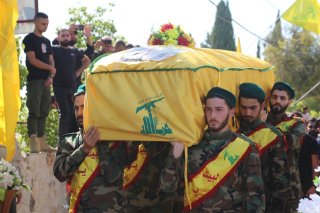Risk Everything or Lose Face? Hezbollah’s Dilemma
The longer the conflict goes on in Gaza, the more Hezbollah will find it difficult to stay out.
In Lebanon, people are trying to go about their everyday lives despite a perpetual state of fear as the situation in the southern border region worsens. The fighting waged between Iranian-backed Hezbollah and Israel is keeping everyone on edge and desperate for a simple question to be answered. Will there be a full-scale war?
It is always a possible outcome. Hezbollah is engaged with its old enemy as a show of support for its ally Hamas after it struck at the heart of Israel—targeting both civilians and military personnel.
The “Al-Aqsa Flood” operation carried out by the Gaza-based organization led to the highest number of Israeli casualties ever sustained—in a single attack in the history of the Palestine-Israel conflict. Over 1200 Israelis were killed, and over 200 people were taken hostage—including some foreign nationals. The retaliation by Tel Aviv has only led to the destruction of Palestinian civilian life in the Gaza Strip. Some media outlets reported that over 11,000 Palestinians, including more than 4,500 children, have been killed by Israel’s relentless bombardment of the territory. These figures were issued by Gaza’s Health Ministry—a government agency controlled by Hamas.
Now, the Israelis want to keep the fighting strictly in Gaza—so they can complete their publicly stated mission of defeating Hamas—preferring not to have a second front open with Hezbollah.
Although Hezbollah has inflicted casualties on Israeli forces, they, too, have lost fighters in the border skirmishes. As of Tuesday, the number of Hezbollah militant deaths has risen to seventy-six after new clashes with Israeli soldiers. Israel is flying reconnaissance missions and hitting the south regularly as a reminder of the destructive power it can unleash on Lebanon. Israel’s Defense Minister Yoav Gallant issued one of the strongest threats, saying the Lebanese civilians would pay a serious price for Hezbollah’s decision. “What we can do in Gaza, we can also do in Beirut.”
At this stage, however, both Israel and Hezbollah are perfectly content with keeping the violence to a minimal level of engagement.
Does this mean the status quo could not reach a breaking point where a new northern front of the war opens? Hardly. The possibility of Israeli jets bombing Beirut and Hezbollah’s precision-guided missiles hitting Tel Aviv will never be wholly avoidable. The United States is trying to mediate between the two sides to escape this nightmare scenario. Washington wants to reduce the probability of a regional war erupting and is using all its leverage to make it happen.
Some in Lebanon have proposed ways to avert a full confrontation with Israel. Major General Abbas Ibrahim, who served as head of Lebanon’s General Security Directorate, spoke with the National Interest on the present situation.
“The United States has many partners around the country. Some of them are official and unofficial. They are in contact with people who they think can make a difference with Hezbollah. So, the Americans are trying to reduce escalations on the border.”
In the past, General Ibrahim played a mediator role for Hezbollah and the United States whenever they needed to communicate. Nevertheless, he categorically denied any direct discussions between them regarding the present conflict.
“I can say, Hezbollah is not engaged in direct talks with the U.S. They are focusing all their efforts on Palestine. There are many attempts to build this channel between Hezbollah and the U.S. but have proven to be unsuccessful so far.”
He said the best guarantee for the war not to engulf Lebanon is for the international community to stop Israel’s attack on Gaza now.
“The problem is not here. What is happening in Lebanon is a result of the fighting between Israelis and Palestinians in Gaza. So, if we want to be realistic, this confrontation will worsen if the Israelis continue to pour more fuel on the fire. The international community must help on this issue. Everyone keeps saying Israel has the right to defend itself. But this does not mean it has the right to go that far.”
Hezbollah is finding itself trapped within its own ideological rhetoric and the current reality. By not displaying the totality of its strength, it risks losing its image as a resistance movement for the “liberation” of historic Palestine. On the other hand, Hezbollah has calculated that such a decision would not serve the group’s long-term political agenda in Lebanon. However, it has not ruled out such an outcome. Everything is contingent on the fighting in Gaza. If a ceasefire is implemented soon, Palestinians, Lebanese, and Israelis can breathe easier. The ball is in the court of the international community.
Adnan Nasser is an independent foreign policy analyst and journalist with a focus on Middle East affairs. Follow him on Twitter @Adnansoutlook29.
Image: Shutterstock.com.

